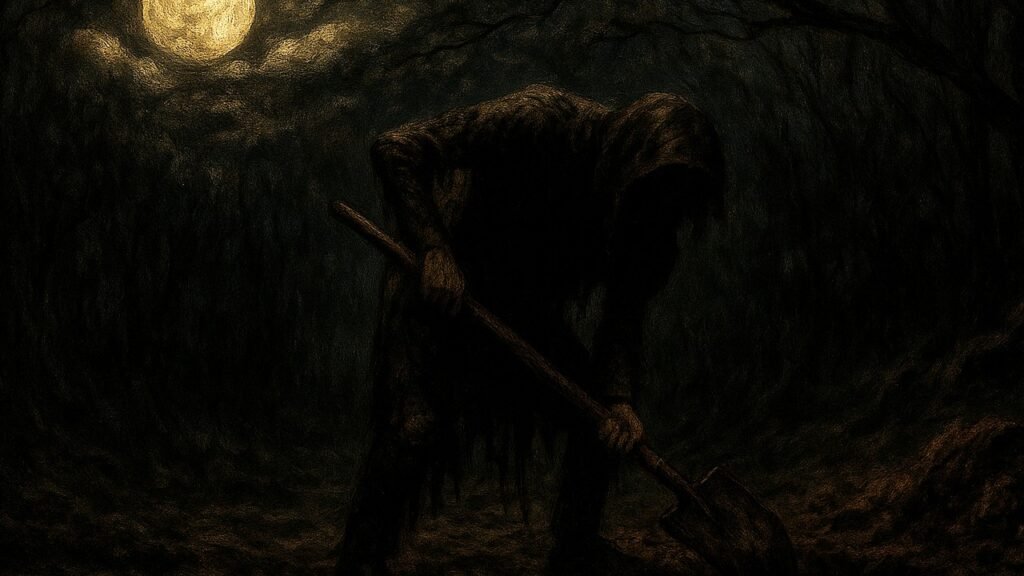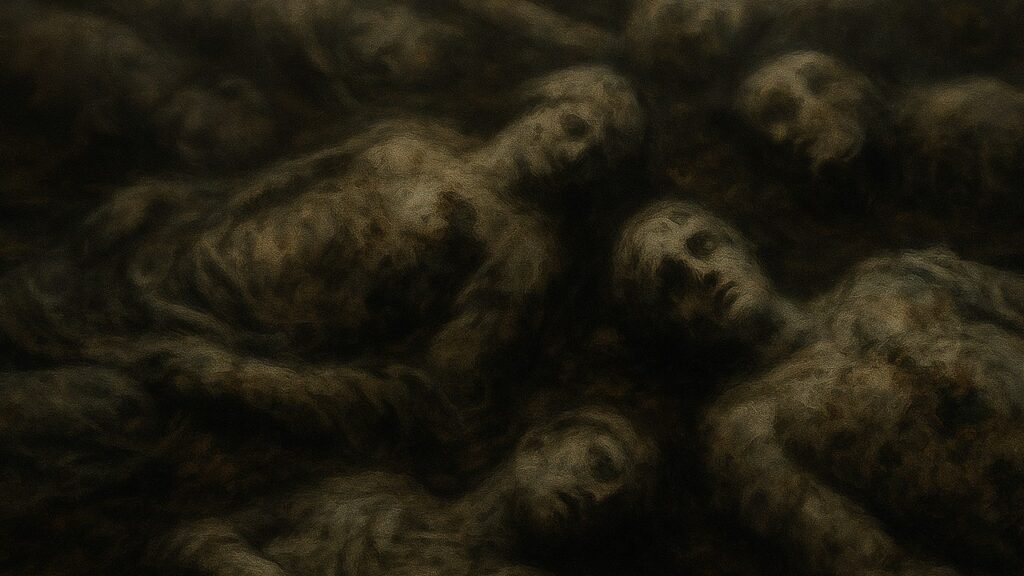A dream of dead bodies, one or many, can sit heavy in the chest.
Before jumping to grim spiritual scenarios, it helps to remember this:
Death in dreams is rarely about actual death.
Often, it’s about endings. Or more precisely, transformations that feel like endings.
When the mind dreams of death, it’s trying to express what words can’t, the closing of a chapter, the letting go of something that no longer fits.
Sometimes, the “bodies” are your old habits, a past relationship, or versions of yourself that you’ve outgrown but haven’t buried properly yet.
It’s your psyche’s poetic (and yes, occasionally disturbing) way of saying, something inside you has changed).
- When a Dead Body is a Symbol of Transition, Not Terror
- Psychological Meanings (with a touch of science)
- Cultural Layers and Superstitions
- When It Feels Too Real
- Dreaming of Digging Up a Dead Body
- What It Means When You Dream of a Dead Body of Someone You Know
- Not All Darkness Means Doom
- A Quick Reflection Exercise
- Strange But True: Facts About Death Imagery in Dreams
When a Dead Body is a Symbol of Transition, Not Terror
Quick Meaning Summary
- Unresolved emotions or suppressed feelings coming to the surface
- Endings or transitions that haven’t been fully processed yet
- Fear of loss or change, especially during stressful periods
- Emotional overload or mental exhaustion
- The need for closure around a past experience, relationship, or version of yourself
If the dream feels cold or clinical, it may signal detachment, emotional numbness.
If the image feels sorrowful, like mourning, it might show healing in motion.
Your subconscious is allowing grief to surface in symbolic form so it can finally dissolve.
Psychologists who study dreams like Carl Jung being the usual suspect often viewed death imagery as symbolic renewal.
Jung once wrote that, “death is the dream’s way of dramatizing rebirth.”
That sounds lofty, sure, but it fits: when one thing ends, something else can begin.
Dreaming of multiple dead bodies, though, can suggest overwhelm.
You might be dealing with too many “endings” at once: emotional clutter, unfinished grief, or unacknowledged stress.
Across cultures, a dead body in a dream can symbolize purification or release, especially when the dreamer feels peace rather than horror.
It’s the psyche’s cleanup process. What’s finished can finally rest, and what’s left can begin again.
The brain, brilliant as it is strange, sometimes stacks imagery to get your attention.
Think of it like a mental warning light blinking “Hey, you’ve got unresolved stuff piling up here.”
There’s also a strange duality to it. The body is gone, lifeless, yes… but it’s still visible. Still there.
That tension mirrors the way we carry emotional remnants: things we swear we’ve moved on from but still feel tugging at us in quiet moments.
Psychological Meanings (with a touch of science)
Sleep researchers have noted that dreams involving death or decay often appear during periods of major life change, new jobs, breakups, relocation, loss.
A 2014 study in the Journal of Sleep Research even linked death imagery to emotional processing, showing how the brain uses dreams to “simulate” difficult experiences in a safer, symbolic space.
In other words, your subconscious rehearses closure before you’re ready to face it in waking life. Creepy, but oddly considerate.
Cultural Layers and Superstitions
Across cultures, dreaming of the dead has wildly different meanings. In parts of Eastern Europe, it’s said to be good luck, a sign that blessings or money are on their way.
In Chinese dream lore, dead bodies sometimes symbolize the removal of bad energy or misfortune.
Meanwhile, Western interpretations have leaned more psychological, focusing on suppressed emotions or internal change rather than omens.
There’s no universal rule, and maybe that’s the point. Dreams meet you where you are, filtered through your own memories, beliefs, and fears.
When It Feels Too Real
Every so often, someone will say, “It didn’t feel like a dream. It felt like I was really there.”
That hyper-real texture often happens in what’s called REM intensification, the stage when your brain’s limbic system (emotion center) lights up like a flare.
It can make the imagery feel almost tangible.
If the dream repeats, or leaves you unsettled long after waking, journaling can help, even a few quick lines before the details fade. Sometimes the simple act of naming what you saw loosens its grip.
Dreaming of Digging Up a Dead Body

Now that’s a dream that tends to linger, isn’t it?
You wake up almost tasting the dirt, heart thudding, trying to shake off that uneasy image.
It’s not just eerie, it’s loaded. Dreaming of digging up a dead body usually means you’re revisiting something you thought you’d buried long ago.
In dream psychology, digging is an act of excavation, pulling something hidden from the unconscious into the light.
The dead body represents what’s been repressed: old emotions, unfinished grief, a mistake, or even a forgotten version of yourself.
So when your dreaming mind starts digging, it’s saying, “We’re not done here yet.”
This imagery often appears when healing begins.
Maybe you’ve started therapy, opened up about a painful memory, or stumbled on something that reawakened an old wound.
The act of unearthing can be messy, but necessary, your subconscious trying to process what’s been quietly rotting beneath the surface.
There’s also guilt woven into these dreams and you might feel responsible for something long past, even if it’s irrational.
The body in this case becomes symbolic evidence, proof of what you’ve carried too long and digging it up doesn’t mean self-punishment; it means readiness.
You’re brave enough to face what’s decayed and decide whether it still deserves space in your emotional soil.
Spiritually, some traditions interpret this dream as a reckoning. an awakening of conscience or buried intuition.
In folklore from parts of Eastern Europe and the Caribbean, uncovering the dead is said to reveal truth: secrets, betrayals, or lessons that demand recognition before true renewal can happen.
So yes, it’s dark but it’s not doom (and hey, you’re not burying a dead body).
Dreaming of digging up the dead is your mind’s strange way of saying: It’s time to stop pretending that didn’t happen.
Bring it to light, clean it off, and let it rest properly this time.
What It Means When You Dream of a Dead Body of Someone You Know
This one cuts deeper.
Seeing the dead body of someone you actually know, a friend, family member, even someone you haven’t spoken to in years, can leave you disturbed as hell, looking for answers.
It feels too personal, too close to real. But again, dreams speak in symbols most of the time, not literal fates.
Usually, when a familiar face appears lifeless in your dream, it represents the end of a particular dynamic or emotional connection, not the person’s physical death.
Maybe the relationship has shifted, cooled, or ended quietly without closure.
The “body” is your mind’s visual way of saying, that chapter is over.
If the person in your dream is still alive in waking life, it might mean you’re processing emotional distance or perhaps you’re recognizing qualities in them (or yourself) that have faded away.
Sometimes, the dream points to transformation: that person is changing in your life’s story, moving into a new role, or reflecting a change in how you see them.
There’s also another layer, the personal mirror.
Often, someone we dream about represents a part of ourselves linked to them: the way we used to act around them, the emotions they drew out of us.
When you see their body in a dream, it may be your subconscious saying that your connection to that version of yourself has ended.
If the feeling in the dream is sadness or regret, it’s worth asking: “What about this person feels unresolved?”
Your psyche might be nudging you toward healing, forgiveness, or acceptance, whether or not you ever speak to them again.
Interestingly, dream studies (like one published in Dreaming, the APA journal, 2020) found that people often dream of familiar dead figures during periods of transition or emotional realignment.
It’s the brain’s way of filing old emotional data, making sense of attachment and loss without conscious permission.
This dream isn’t a premonition (usually).
It’s a sign of reflection, a quiet emotional reckoning between your past self and your present one, wearing the face of someone you once knew well.
Not All Darkness Means Doom
It’s worth remembering that dreams often exaggerate to make a point.
A dead body doesn’t necessarily predict tragedy; it could represent healing such as an old resentment which has finally “died.”
Or maybe you’re stepping out of an old identity.
I’ve seen people describe these dreams right before major personal breakthroughs, starting therapy, cutting ties with toxic situations, rediscovering joy.
Death, in the dream world, isn’t the finale. It’s the scene change.
A Quick Reflection Exercise
If you’ve had a dream like this, try asking yourself:
- What’s been ending in my waking life lately?
- Is there something I’ve been avoiding closure on?
- Did the bodies remind me of anyone, or any version of myself?
There’s no single right answer, and that’s the beauty of dream interpretation, it’s deeply personal.
Strange But True: Facts About Death Imagery in Dreams
- You’re not alone in having them. Studies show that nearly 1 in 5 people report dreaming about death, dying, or dead bodies at least once in their lifetime. These dreams are more common during stress or major life transitions — not necessarily linked to real-world danger or loss.
- Your brain’s trying to “rehearse” emotion. During REM sleep, the amygdala (which processes fear and emotion) becomes extra active while the logic centers quiet down. That’s why dreams often feel raw and exaggerated. The brain uses them to rehearse emotional resilience — basically, it’s running drills for your feelings.
- Death dreams often appear after personal breakthroughs. Counterintuitive as it sounds, dream researchers have noticed that death imagery can spike right before major turning points — new jobs, breakups, healing from trauma. Psychologically, the “death” symbolizes shedding an old self to make room for growth.
- Cultural meanings differ wildly. In Mexican folklore, seeing the dead in dreams can be a reunion rather than a fright — a sign that loved ones are watching over you. In Hindu traditions, dreaming of the dead may hint at unfinished karma or the need for spiritual cleansing. Context, belief, and personal feeling change everything.
- You can sometimes feel physical sensations. People often report smells, sounds, or the sense of “presence” in such dreams. Neurologically, this happens because REM sleep blurs boundaries between dream imagery and sensory memory — a phenomenon similar to lucid dreaming.
- Dream recall shapes interpretation. The details you remember most vividly — the number of bodies, the setting, the emotion — usually point to the real message. Repeated imagery means your subconscious is insisting on being heard.
- Nightmares have benefits. Yep, even the scary ones. Researchers at the University of Geneva (2019) found that people who experience mild to moderate nightmares tend to handle fear responses better when awake. So in an odd twist, your nightmare might be emotional training.
Sources for Reference:
- American Psychological Association, Journal of Sleep Research, Vol. 23, Issue 4 (2014): “Dreams and Emotional Processing.”
- Jung, C.G. The Archetypes and the Collective Unconscious. Princeton University Press, 1968.
- Domhoff, G.W. (2021). The Emergence of Dreaming: Mind-Wandering, Embodied Simulation, and the Default Network. Oxford University Press.
Dreams and patterns: Dreams involving death or decay often symbolize deep transitions, fear of loss… themes that also commonly appear in dreams about teeth falling out.




